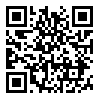Volume 7, Issue 1 (9-2021)
FPJ 2021, 7(1): 131-140 |
Back to browse issues page
Download citation:
BibTeX | RIS | EndNote | Medlars | ProCite | Reference Manager | RefWorks
Send citation to:



BibTeX | RIS | EndNote | Medlars | ProCite | Reference Manager | RefWorks
Send citation to:
Ahmadvand F, Niknejadi F. Standardization of the Questionnaire for Mothers' Attitudes toward Child-Rearing. FPJ 2021; 7 (1) : 150
URL: http://fpcej.ir/article-1-312-en.html
URL: http://fpcej.ir/article-1-312-en.html
1- M A of psychometry, Department of Psychoanalysis, Faculty of Literature and Humanities, Khomeini Shahr Azad University, Isfahan, Iran. , fahmadvand55@gmail.com
2- Assistant Professor, Department of Psychology, Faculty of Literature and Humanities, Azad University, Khomeini Shahr Branch, Isfahan, Iran.
2- Assistant Professor, Department of Psychology, Faculty of Literature and Humanities, Azad University, Khomeini Shahr Branch, Isfahan, Iran.
Abstract: (1124 Views)
Background: Attitude toward child-rearing is one of the factors that is very effective on the mental, emotional, and behavioral efforts of parents especially mothers in adapting strategies for children-rearing. Objective: The goal of this research is to standardize the questionnaire for mothers’ attitudes toward child-rearing. Methods: In this descriptive research the methodology is of standardizing type. The statistical population herein were mothers in Tehran in 2018-19. 599 mothers from Tehran were randomly selected using the multistage cluster sampling method and were placed in the sample group. In this research, data analysis was done in two descriptive and inferential levels, and abundance, percentage, percentage rating, Z & T score, exploratory factor analysis, confirmatory factor analysis, correlation coefficient, index of fit, Cronbach's alpha, and retest were used. Findings: Fundamental factors of the questionnaire, three cognitive, behavioral, and emotional realms were determined and 27 questions have the necessary factor loading. Found data demonstrate that the questionnaire for mothers’ attitudes toward children rearing has structural validity, convergent validity, internal consistency, and content validity, and using Cronbach’s Alpha, questionnaire reliability is higher than 0.84. The content validity of this questionnaire was approved by experts. IFI, TLI, CFI, NFI, GFI, and RMSEA indexes approve the desirable and appropriate validity. Results: Results show that the questionnaire for mothers’ attitudes toward children rearing has appropriate validity, reliability, and norms. In addition, as education is increased, a more favorable attitude toward child rearing is seen in the sample group but employment and age did not make any difference.
Article number: 150
References
1. Azami, K. Qaderi, R. Fathi, M. Rafiei, H. and Qaed Amini, Gh. (2014). The relationship between parenting styles and cohabitation with delinquent peers. Social issues of Iran. 14 (6): 33-47. (in Persian) Doi: 10.18869/acadpub.jspi.7.1.57
2. Arjmandnia, Ali Akbar, Safaei, Ismail, Maleki, Samaneh. (2018). Evaluation of psychometric properties of Arjmandnia parenting practices scale. Bi-Quarterly Journal of Family Psychology, 4 (1), 53-64. (in Persian). https://www.ijfpjournal.ir/article_245525.html
3. Asghari Nikah, S. M., Balkhana Abadi, M. (2013). Validation and revision of the Parents' Attitude Scale for Children with Special Needs, Exceptional People Quarterly, 11 (3): 147-163. (in Persian) https://jpe.atu.ac.ir/article_786.html
4. Alborzi, M. (2011) . The role of parenting beliefs and mothers' attitudes to creative thinking on children's creativity. Social Psychological Studies of Women, 9 (2): 7-24 (in Persian).doi: 10.22051/jwsps.2011.1396
5. Chan, D. W. (2005). Family environment and talent development of Chinese gifted students in Hong Kong. Gifted Child Quarterly, 49(3): 211-221. https://doi.org/10.1177/001698620504900303
6. Cowan, P. A., Cowan, C. P., Pruett, M. K., & Pruett, K. (2019). Fathers’ and mothers’ attachment styles, couple conflict, parenting quality, and children’s behavior problems: an intervention test of mediation. Attachment & human development, 54(6):1-19. https://doi.org/10.1080/14616734.2019.1582600
7. Chan, T. W., Koo, A. (2010). Parenting style and youth outcomes in the UK. European sociological review, 27(3): 385-399.DOI: https://doi.org/10.1093/esr/jcq013
8. Hornstra, R., Bosmans, G., van den Hoofdakker, B. J., De Meyer, H., & Van der Oord, S. (2019). Self-reported attachment styles in children with and without attention-deficit/hyperactivity disorder (ADHD). European child & adolescent psychiatry,28(12): 1-8. DOI: 10.1007/s00787-019-01288-7 .
9. Khan, F., Fraley, R. C., Young, J. F., & Hankin, B. L. (2019). Developmental trajectories of attachment and depressive symptoms in children and adolescents. Attachment & human development, 31(2): 1-17. DOI: 10.1080/14616734.2019.1624790
10. Fraley, R. C., & Roisman, G. I. (2019). The development of adult attachment styles: four lessons. Current opinion in psychology, 25(5): 26-30. https://doi.org/10.1016/j.copsyc.2018.02.008
11. Kovas, Y., Garon-Carrier, G., Boivin, M., Petrill, S. A., Plomin, R., Malykh, S. B.,... & Brendgen, M. (2015). Why children differ in motivation to learn: Insights from over 13,000 twins from 6 countries. Personality and Individual Differences, 80(8): 51-63. https://doi.org/10.1016/j.paid.2015.02.006
12. Manohar B, Reddy NS, Vyshnavi P, Sravya Sruthi P (2018) Assessment of Knowledge, Attitude and Practice of Mothers with Severe Acute Malnutrition Children Regarding Child Feeding. Int J Pharm Clin Res 10: 150-154. https://ijpcr.com/volume10issue5
13. Philips, N., Sioen, I., Michels, N., Sleddens, E., & De Henauw, S. (2014). The influence of parenting style on health-related behavior of children: findings from the ChiBS study. International Journal of Behavioral Nutrition and Physical Activity, 11(1): 88-95. DOI:10.1186/s12966-014-0095-y
14. Maktobian Baharanchi, Asieh, kalantar Koosheh, Seyed Mohammad, Khanvinzadeh, Mohammad Hossein. (2015). Construction and standardization of parenting questionnaire in Islamic attitude. Quarterly Journal of Research in Islamic Education, 23 (27), 23-43.(in Persian). https://iej.ihu.ac.ir/article_200899.html.
16. Masoudi, H., Mazlum Khorasani, M., Noghani, M. (2015) The effect of paternal role on the religious education of children among families in Mashhad, Islamic Education Quarterly, 20 (10): 141-162. (in Persian). http://islamicedu.rihu.ac.ir/article_551.html
18. Mehri, A., Mehri, F. (2016). The Role of Parents in Raising Children, International Conference on Innovation and Research in Humanities and Socio-Cultural Studies, Qom, 10 (2): 22-36. (in Persian). https://civilica.com/doc/609728/.
20. Tikhomirova, T., & Malykh, S. (2018). Children's perception of parental attitudes: Russia-Kyrgyzstan cross-cultural study. In ITM Web of Conferences (Vol. 18, p. 04007).EDP Sciences, 1-5. https://doi.org/10.1051/itmconf/20181804007
21. Theisen, J. C., Fraley, R. C., Hankin, B. L., Young, J. F., & Chopik, W. J. (2018). How do attachment styles change from childhood through adolescence? Findings from an accelerated longitudinal Cohort study. Journal of Research in Personality, 74 (3):141-146. https://doi.org/10.1016/j.jrp.2018.04.001.
| Rights and permissions | |
 |
This work is licensed under a Creative Commons Attribution-NonCommercial 4.0 International License. |






